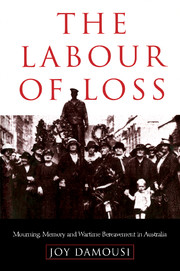Book contents
- Frontmatter
- Contents
- Abbreviations
- Acknowledgements
- Introduction
- Part I The First World War
- 1 Theatres of Grief, Theatres of Loss
- 2 The Sacrificial Mother
- 3 A Father's Loss
- 4 The War Widow and the Cost of Memory
- 5 Returned Limbless Soldiers: Identity through Loss
- Part II The Second World War
- Conclusion
- Notes
- Bibliography
- Index
2 - The Sacrificial Mother
Published online by Cambridge University Press: 06 July 2010
- Frontmatter
- Contents
- Abbreviations
- Acknowledgements
- Introduction
- Part I The First World War
- 1 Theatres of Grief, Theatres of Loss
- 2 The Sacrificial Mother
- 3 A Father's Loss
- 4 The War Widow and the Cost of Memory
- 5 Returned Limbless Soldiers: Identity through Loss
- Part II The Second World War
- Conclusion
- Notes
- Bibliography
- Index
Summary
This awful war is hard on all of us but on none more than the mothers of our soldiers.
Immediately after the war, mothers of the dead were in favour. In the early months of 1919, during the first time in four years when they would no longer be waiting for news of their sons, mothers were honoured with a badge which bore one star for each son or brother who had died. In announcing the release of the badge, Senator George Pearce, the Minister for Defence since 1914, proudly declared that, while the badge would be ‘simple in design but chaste’, it would be ‘cherished by the honoured possessors who have specially earned the sympathy and admiration of their fellow citizens’.
Such symbols of honour and sacrifice were appreciated by mothers at the time, but they soon came to be seen as hollow recognition. It was universally acknowledged that, in offering 60 000 lives to the imperial cause and in suffering another 150 000 injured, Australia had made a significant impression on the course of events. After the war, however, an unspoken but underlying question gnawed at the minds of those who struggled to gain compensation for their bereavement: whose sacrifice was to be deemed die most worthy among the living? In peace, a crucial subtext emerged in the campaigns launched by returned soldiers, mothers and fathers of soldiers deceased and alive, widows and wives: to what extent should these familial groups be honoured in recognition of their loss?
- Type
- Chapter
- Information
- The Labour of LossMourning, Memory and Wartime Bereavement in Australia, pp. 26 - 45Publisher: Cambridge University PressPrint publication year: 1999

